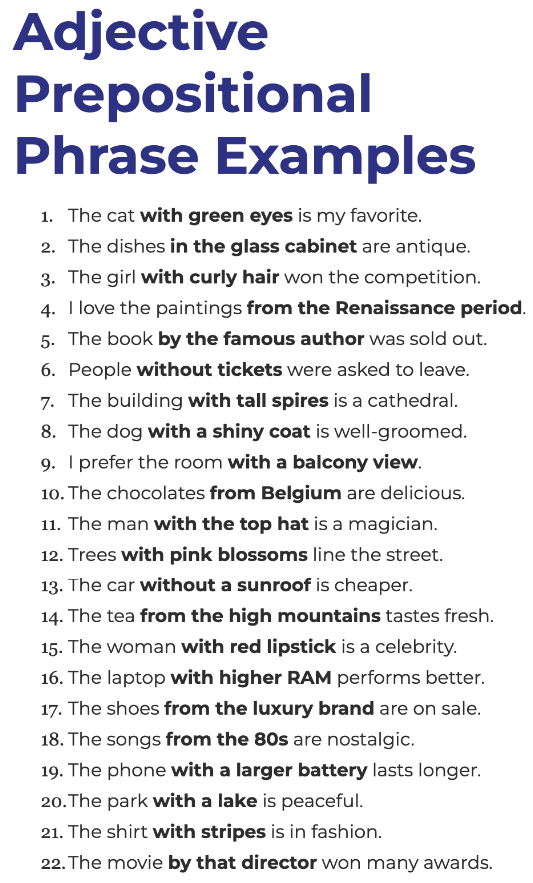ref – https://www.examples.com/english/adjective/adjective-prepositional-phrase.html
Begins with a preposition and functions as an adjective.
[The cat with green eyes] is my favorite.
[The dishes in the glass cabinet] are antique.
[The girl with curly hair] won the competition.
I love the [paintings from the Renaissance period].
[The book by the famous author] was sold out.
[People without tickets] were asked to leave.
[The building with tall spires] is a cathedral.
[The dog with a shiny coat] is well-groomed.
I prefer [the room with a balcony view].
[The chocolates from Belgium] are delicious.
The man with the top hat is a magician.
Trees with pink blossoms line the street.
The car without a sunroof is cheaper.
The tea from the high mountains tastes fresh.
The woman with red lipstick is a celebrity.
The laptop with higher RAM performs better.
The shoes from the luxury brand are on sale.
The songs from the 80s are nostalgic.
The phone with a larger battery lasts longer.
The park with a lake is peaceful.
The shirt with stripes is in fashion.
The movie by that director won many awards.
The house with the blue door is haunted.
The cake with cherry toppings is sweet.
I bought the plant with fragrant flowers.
The bag from the top shelf is expensive.
The boy with a guitar is a musician.
The museum with ancient artifacts is renowned.
The pizza with extra cheese is popular.
The novel about vampires is a bestseller.
The island with white sandy beaches is a tourist attraction.
The shop on the corner street sells vintage items.
The dish with spicy seasoning was flavorful.
The city with historic monuments attracts tourists.
The garden with colorful butterflies is beautiful.
The necklace with a diamond pendant is exquisite.
The teacher with a PhD is knowledgeable.
The hotel near the airport is convenient.
The bird with bright feathers is exotic.
The coffee from Colombia is strong.
The show by the popular network is trending.
The stadium with larger capacity hosted the finals.
The festival during the summer was fun.
The bicycle with gear system is advanced.
The workshop for beginners was informative.
The forest with dense trees is mysterious.
The cafe by the riverside offers a scenic view.
The story about aliens was intriguing.
The valley with snow-capped peaks is picturesque.
The game for kids is educational.
[The meal with vegan ingredients] was wholesome.
[The castle atop the hill] is ancient.
[The jacket made of leather] is stylish.
[The song from the latest album] is catchy.
[The park with a playground] is children’s favorite.
[The sculpture of the dancing lady] is mesmerizing.
T[he town near the coastline] has a maritime climate.
[The dish without any spices] is bland.
[The festival during winter] is a cultural highlight.
[The hotel with a swimming pool] is in high demand.
[The forest full of wildlife] is a biodiversity hotspot.
[The artist with a unique style] held an exhibition.
[The team from the southern region] won the championship.
[The river with crystal-clear water] is pristine.
[The book about time travel] is a page-turner.
The school beside the lake has a tranquil setting.
The bakery with gluten-free options is health-conscious.
The mountain with treacherous trails is a challenge for trekkers.
The shop selling antiques has rare collections.
The movie set in the 1920s is a period drama.
The street lined with maple trees turns golden in autumn.
The car with a sunroof is a premium model.
The bridge over the wide river is an architectural marvel.
The instrument from the classical era is precious.
The painting depicting a sunset is evocative.
The pastry filled with cream is delectable.
The island without any inhabitants is remote.
The building with green architecture is eco-friendly.
The course for advanced learners is intensive.
The bird with a melodious call is sought by birdwatchers.
The market during the festive season is bustling.
The dessert topped with nuts is crunchy.
The region known for its wines is a must-visit for connoisseurs.
The shoes with cushioned soles offer comfort.
The beach with golden sands is serene.
The seminar for entrepreneurs was enlightening.
The journey through dense forests was adventurous.
The computer with high processing speed is efficient.
The concert featuring international artists was grand.
The village with traditional huts preserves its heritage.
The theme park with thrilling rides attracts many visitors.
The tea with aromatic herbs is refreshing.
The bookshelf made of oak wood is sturdy.
The camera with a high-resolution lens captures sharp images.
The gallery showcasing abstract art is avant-garde.
The tree with fragrant blossoms is a spring delight.
The phone with a long battery life is reliable.
The cafe offering organic brews is health-centric.
The game with virtual reality offers immersive experience.
The fabric dyed in natural colors is eco-conscious.
